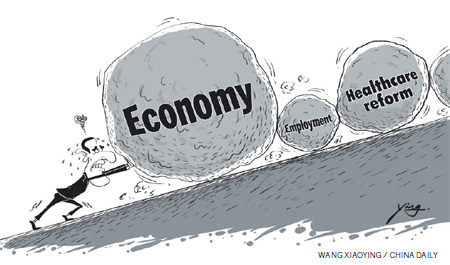View
So far, not so good, but Obama has time
By Ren Jingjing (China Daily)
Updated: 2011-01-13 08:02
 |
Large Medium Small |

The year 2010 was particularly difficult for United States President Barack Obama both on the home front and abroad. The flagging US economy not only led to the Democratic Party's massive defeat in the midterm elections, but also seemed to have shattered Americans' faith in Obama's capability and commitment to "change".
Many regard the Nov 2 midterm elections as a referendum on Obama's leadership and performance during his first two years in office. The Republican Party wrested control of the House of Representatives, leaving Democrats just about clinging on to their majority in the Senate. The strengthened presence of Republicans in Congress will upset Obama's administrative platform in terms of tax and fiscal planning, and undermine his stance on climate change, trade liberalism, disarmament and other international issues.
Obama entered the White House holding aloft the banner of "change" when the world was caught in the vortex of a financial crisis and the US economy had suffered serious blows.To deal with the crisis, the Obama administration adopted a series of immediate measures, including the largest-ever economic stimulus package and an auto industry rescue plan, promotion of policies in finance, healthcare, clean energy and education to sustain economic growth and avoid another major economic downturn. It also resorted to trade protectionism and made efforts to ease debt pressure by devaluating the US dollar.
Though the measures have played a certain role in preventing the US economy from sliding further and re-instilling confidence in the domestic market, their results have not satisfied the American people. The stimulus plan "stabilized" the economy but failed to reduce the unemployment rate, which has been lingering around a record 10 percent.
The US Congress has passed a sweeping financial regulatory bill to crack down on banks and Wall Street to rule out the possibility of another major financial meltdown. But it is yet to root out the main cause of the global financial crisis.
Obama's $787-billion economic stimulus package and $700-billion financial rescue plan have helped strengthen the US economy, but the "government-driven" momentum is unsustainable.
The healthcare reform has certainly made considerable headway, but there has been no relief from the all-time high fiscal deficit of $1.42 trillion. On the contrary, the healthcare reform could increase the deficit further. So, to reduce the huge deficit, the administration has decided to freeze government expenditure - except on national security, healthcare and social security - for three years from 2011.
On the foreign policy front, the Obama administration has been using "smart power" and the pledge to build a "multi-partner" and "nuclear-free" world to rekindle traditional US-European Union ties, restart US-Russia strategic relations, reshape its ties with the Islamic world, and to return to Latin America and East Asia. But the motive behind all this is renewal of the US' global leadership role.
On May 27, the Obama administration announced its first National Security Strategy, which justified many of former US president George W. Bush's policies, including the "preemptive" security strategy and unilateralism.
The new strategy will focus on "multilateralism" and "building partnerships" around the world to reshape the US' international image. Obama had planned to withdraw most of the US troops from Iraq and concentrate on wiping out Al-Qaida and resolving the Afghan issue. But contrary to Obama's expectation, the situation in Afghanistan is worsening.
Obama knows that the root of Middle East crisis lies in the Israeli-Palestinian issue. But his administration has not achieved much in taking the Israeli-Palestinian peace talks forward to resolve the issue and help establish an independent Palestinian state.
On the Korean Peninsula and the Iran nuclear issues, Obama feels quite helpless. After the exchange of fire between the Democratic People's Republic of Korea (DPRK) and the Republic of Korea (ROK) on Nov 23, the US held a series of large-scale joint military drills with the ROK and Japan to deter the DPRK. The DPRK response, however, suggests the US' Northeast Asia policy has exhausted all its tricks.
To be honest, Obama inherited a rotten economic and political legacy. He has made great efforts to right his predecessor's wrongs by trying to reform healthcare, and revise the US war policy and economic stimulus program. But his policy of "change" has seen only limited success.
Even after the passage of the healthcare legislation, Obama's top priority at home, Americans are still bitterly divided over the medical reform and instead want the administration to focus more on boosting the economy and creating more jobs.
So, is Obama's commitment on reform a political bubble, or does it represent the direction of the US' development? Is Obama incapable of delivering on his promises or are interest groups and bitter political partisanship the cause of the administration's feeble performance? And is Obama a reformer of great talent and bold strategy or a "political performer" with excellent acting skills?
It's too early to answer any of these questions, because Obama can still get his act together and make things different.
The author is a research scholar with the Chinese Academy of Social Sciences.
(China Daily 01/13/2011 page9)